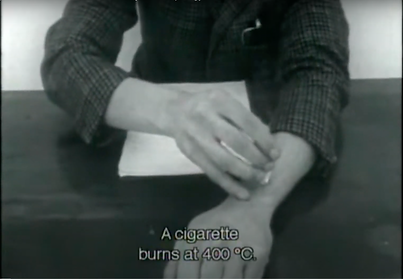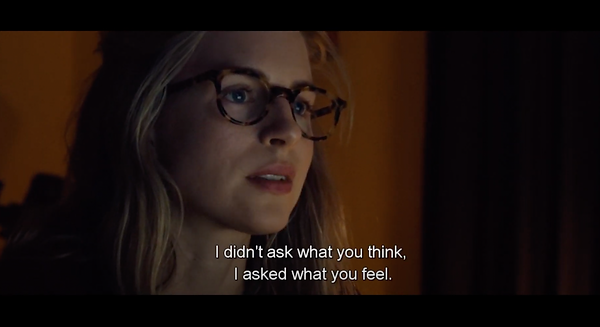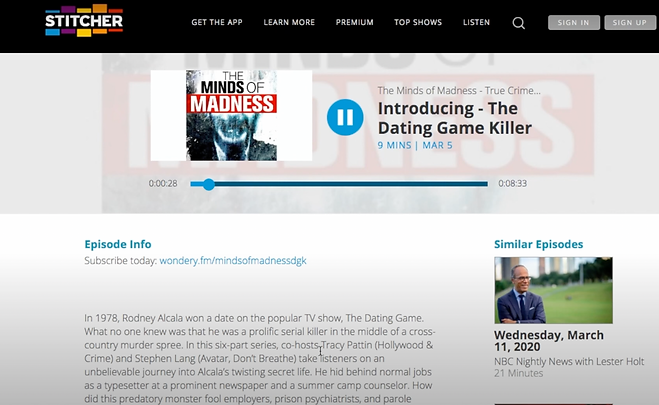top of page

Video Essay: Anthropology of Affect
Affect is abstract but it is everywhere from consumer culture to politics to everyday interactions.
Research Questions:
-
What makes an affect ordinary?
-
How different communication mediums create affect?
-
In which ways can affect function as a mobilizing tool?
I open the video by showing a clip from Harun Farocki’s "Inextinguishable Fire".


This video was produced in the context of the Vietnam War and a US Napalm attack.
It communicates and induces affect in an impactful way, in a way that words alone wouldn't be able to.
Showing an ordinary action of 'smoking a cigarette' makes cigarette burn easily imaginable and the pain – perceivable. Using this analogy of contrast, it draws on the viewer's imagination to communicate the magnitude of Napalm attack.

Context matters...

Affect is not created in isolation and its impact is always dependent on the context of its time –on political, economical and social factors.
Just like the background of this slide. What today is an old grain film, once was the only film there was. The current, the everyday, the ordinary that wouldn't produce the same type of affect it does today.
To contrast the temporal function of affect, I use a contemporary example...

What some might have found cute in 2013, in March 2020 produces a completely different type of affect.
The ordinereness of kid's encounter with the world is no longer ordinary.

The quote is from one of the shorts from Lauren Bretlant's book The Hundreds. Although she directly draws on the themes of affect, ordinariness and its fluid ambitious nature, the last line of this quote ("What's a sneeze or sickening") establishes a different emotional connection to the contemporary present that it did in the year of the book's publication (2019).
In her New Yorker article, which I include in my video essay, she talks about the use of affect as a mobilizing tool in politics.

...which I contrast by using one of the most prominent examples from contemporary politics.




While the example of President Trump and contemporary politics is easy to dismiss and assign to the differences in political views, the next scene opens up a conversation of affect as a building tool for social compliance.
"This show is about how readily we hand over ownership of our lives everyday. Can social compliance make someone push a living breathing human being to their death?"
These lines are from the trailer for the show Push and provide another contrasting example of 'subtleties of affect' in action.

While Push is a social experiment show, and Trump may seem as an out of ordinary example in politics, there are indeed plenty of examples where affect is responsible for our inability to see clearly...


I use an audio track which is an introduction to a documentary podcast about a serial killer, Rodney Alcala, who won a date on the popular TV show, and millions of people have not suspected anything.
I continue to highlight this prominent narrative by using further examples from the movies.


The Law Abiding Citizen and The Breaking Bad both feature the figure of the ordinary father who lives a simple life, yet becomes completely something else in the aftermath of an affective encounter that changes his life. Both narratives also draw on the subtleties of affect that the characters use to maintain their image in the eyes of others.

While the perpetuation of this narrative in the movies is consistent with real life examples, it also creates a pattern that views the world in such way where everything is a lie and "there's always something wrong with other people".
...which brings us to the point where the atmosphere of anxiety is produced, normalized and becomes an ordinary affect of the everyday life.

The Netflix documentary series The Mind, Explained has its own episode on anxiety. It talks about how the clinical anxiety rates actually haven't changed throughout the years and "it is not the first time people have been feeling like they are living through an anxiety epidemic".
The common thread in affective response of anxiety is the ambiguity.
In the words of Berlant, "Not knowing until later... what's a sneeze or a sickening".
She speaks about it directly in another passage:

It brings to question the very nature of knowledge and what it means to know? What is objective? And what is then a lie?

Chidi and Eleanor are the two contrasting examples in the TV show The Good Place. Chidi is the seeker of knowledge. He wants to know the answers to all the questions and presents a rather anxious character, who is consumed by fear to live, even after he died. Eleanor in her turn presents an opposing character that just lives and doesn't ask too many questions, which creates a lot of chaos in her life.
The chosen fragment highlights their different response they have to lying and understanding of what knowledge really is.
I use these popular narratives to create an easy way for the viewer to draw connections and relate to the theoretical concepts in the way they show up in the everyday life.
I finish this video essay by the lengthy fragment from the movie "I Origins", which once again highlights the ambiguous nature of knowledge and what it means to know. The movie explores the difference between the spiritual knowledge as a 'felt experience' (affective response) and the knowledge as scientific facts and data.


In essence, this is the affect theory.
Within the field of UX, this is the deeper understanding of human behaviour and importance of empathy.
Knowing what people think is one thing.
Knowing what people feel is another.
Feeling what people feel is something else together.

bottom of page
